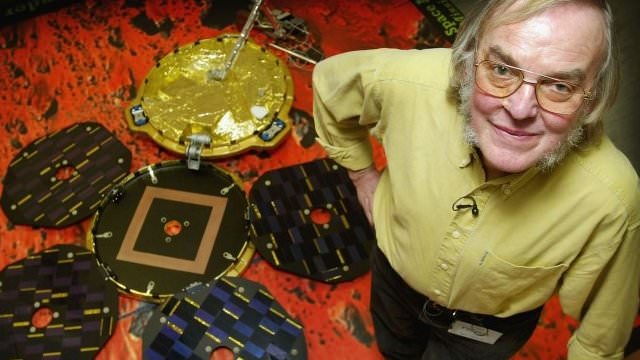British planetary scientist Colin Pillinger has passed away. Pillinger, age 70, was best known as leading the 2003 attempt to land the Beagle 2 spacecraft on Mars, part of the European Space Agency’s Mars Express mission.
His family said in a statement: “It is with profound sadness that we are telling friends and colleagues that Colin, whilst sitting in the garden yesterday afternoon, suffered a severe brain hemorrhage resulting in a deep coma. He died peacefully this afternoon at Addenbrooke’s hospital, Cambridge, without regaining consciousness … We ask that all respect our privacy at this devastating and unbelievable time.”
While the Beagle 2 spacecraft failed and likely crashed on Mars, the mission was notable because it was the first time an individual researcher had sent their own vessel into space and the first British-built interplanetary spacecraft. However, a lack of funding meant the Beagle 2 project always struggled. The spacecraft did launch, but all contact with Beagle 2 was lost after its separation from the Mars Express spacecraft, just six days before atmospheric entry.
However, the BBC noted that the mission was “a turning point in bringing together the space science and industrial communities in the UK – which didn’t used to speak with one voice. Beagle-2 wasn’t built in Colin’s backyard: it was the product of UK brains and hard-work in many companies and universities.”
You can read more about Pillager’s career and achievements at the BBC and the International Business Times.


Sad news indeed. Here was a typically British scientist/engineer who had an idea and despite the best efforts of the government and wider science community to put hurdles in his way he succeeded. The only way he was able to bring this idea to the wider public was through appearances on Patrick Moore’s ‘The Sky At Night’. With a ‘small’ amount of money, £50M, he and his dedicated team built the bl**dy thing in the science equivalent of a garden shed out of tin foil, odd nuts and bolts, springs, bent wire, some light bulbs, gaffer tape, solder and a huge amount of finger-crossing. And it worked. In spite of the opposition and not so well hidden laughter of the wider scientific community he persuaded ESA to put on one of their missions and off it went, the mission covered by Patrick Moore and team and then the media in general. Ok, it crashed but that didn’t dent Pillnger’s enthusiasm or determination to “give it another go”. Visit the Science Museum in London and look at a replica – it’s smaller than a dustbin lid – and marvel at British scientific ingenuity, guts, sheer bloody mindedness to succeed, in spite of government hostility, and knowledge that you’re right. Colin Pillinger, Patrick Moore, Magnus Pike. All engaging personalities, all bonkers on the surface yet all deeply dedicated, knowledgeable scientists and passionate about their subjects. The scientific community has lost a pioneer and visionary.
” Colin Pillinger, Patrick Moore, Magnus Pike. All engaging personalities, all bonkers on the surface yet all deeply dedicated, knowledgeable scientists and passionate about their subjects. The scientific community has lost a pioneer and visionary.”
Could not agree more. Colin Pillinger, had passion, a huge desire to bring understanding of the wonder of space, the galaxy, and the solar system to ordinary people.
I for one will miss him.
Thank you Colin for all the hard work and passion you put in to this project we will all miss you and your wonderful personality … rest in peace
The epitome of being British. Ultimately it doesn’t matter if you suceed or fail but only that you tried! And by all accounts Beagle 2 was a close run thing.
A brilliant example of how an individual can inspire the others in the team and the outside community to acheive a great deal in a very short time and for almost no money. We need more like him!
Although I don’t have a lot of knowledge of Colin and Beagle spacecraft. I do know of Patrick Moore and would like to express gratitude to the greats of British Astronomy and astrophysics (like Colin) for enriching my life and inspiring immensely.
I met Colin back in 2002 when he took the considerable trouble to visit my local astronomical society to talk about the Beagle 2 mission to Mars. I remember that he was extremely knowledgeable, driven, and enthusiastic about space exploration and planetary science. I am deeply saddened by his passing.